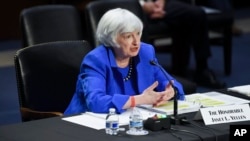The U.S. government is likely to run out of money to pay its bills on October 18 if the country’s debt ceiling is not raised, Treasury chief Janet Yellen warned congressional leaders on Tuesday.
She said that absent a congressional vote to lift the country’s debt ceiling, either to a specific amount or to some extended date to allow continued borrowing, Treasury officials expect the country “would be left with very limited resources that would be quickly depleted” after the next three weeks.
Senate Democratic Majority Leader Chuck Schumer later tried but failed to win unanimous support to hold a simple majority vote in the 100-member chamber to raise the debt ceiling rather than the 60-vote threshold needed for most major legislation.
But Republicans blocked the new effort to raise the borrowing limit, just as on Monday they defeated legislation that also would have averted a partial government shutdown starting on Friday.
The national government’s debt now stands at $28.4 trillion, but the U.S., virtually alone among governments throughout the world, has for decades imposed limits on its borrowing or occasionally lifted the debt ceiling until a certain date.
Congress has always raised the debt ceiling or lifted it entirely for a period of time to prevent the U.S. from defaulting on its debts, averting a worldwide financial crisis spawned by the biggest global economy.
But now the country is facing a new cash crunch without congressional approval for more borrowing.
Long-term government borrowing is designed to pay for measures already approved over the years by Congress, including aid supported by both Republican and Democratic lawmakers in the last year to help the U.S. economy recover from the coronavirus pandemic.
But Senate Republicans on Monday blocked the Democratic-supported measure to raise the debt ceiling, contending that a new debt limit would allow for passage of spending Republicans oppose, as much as $3.5 trillion that President Joe Biden and many congressional Democrats support to provide the biggest expansion of U.S. social safety net programs since the 1960s.
In her letter to congressional leaders, Yellen said the government’s daily cash flow varies widely, from nearly $50 billion a day over the last year to as much as $300 billion.
“As a result, it is important to remember that estimates regarding how long our remaining extraordinary measures and cash may last can unpredictably shift forward or backward,” she said. “This uncertainty underscores the critical importance of not waiting to raise or suspend the debt limit.”
“The full faith and credit of the United States should not be put at risk,” she said.
Yellen said that past debt limit impasses have shown “that waiting until the last minute can cause serious harm to business and consumer confidence, raise borrowing costs for taxpayers, and negatively impact the credit rating of the United States for years to come. Failure to act promptly could also result in substantial disruptions to financial markets, as heightened uncertainty can exacerbate volatility and erode investor confidence.”
The legislation rejected by Senate Republicans on Monday would also have averted a partial government shutdown on Friday, October 1, the start of a new fiscal year for the national government.
Republicans say they will support stand-alone legislation to keep the government operating into December while budget negotiations continue, but not a measure combining it with an increase in the debt ceiling. That could force the narrow Democratic majorities in both chambers of Congress to approve the debt ceiling increase on their own without Republican support.
"We are not willing to help Democrats raise the debt ceiling while they write a reckless taxing and spending spree of historic proportions behind closed doors," Senate Republican leader Mitch McConnell told the Senate.
Democrats say some of the nation's debt was incurred during the administration of President Donald Trump because of large tax cuts he supported. Historically, both parties have voted to raise the limit to prevent the United States from defaulting on its debts.
Schumer said that the Republican action is "one of the most reckless and irresponsible votes I have seen take place in the Senate" and that "the Republican Party has solidified itself as the party of default."
In addition to debate on the debt ceiling, Congress is in the midst of contentious discussions on the Democrats’ plan for the social safety net spending, with no Republicans supporting it.
There is more bipartisan support for a $1 trillion infrastructure plan to fix the country’s deteriorating roads and bridges and expand broadband internet service throughout the country. House Speaker Nancy Pelosi has scheduled a Thursday vote on the legislation, which the Senate has already approved.





